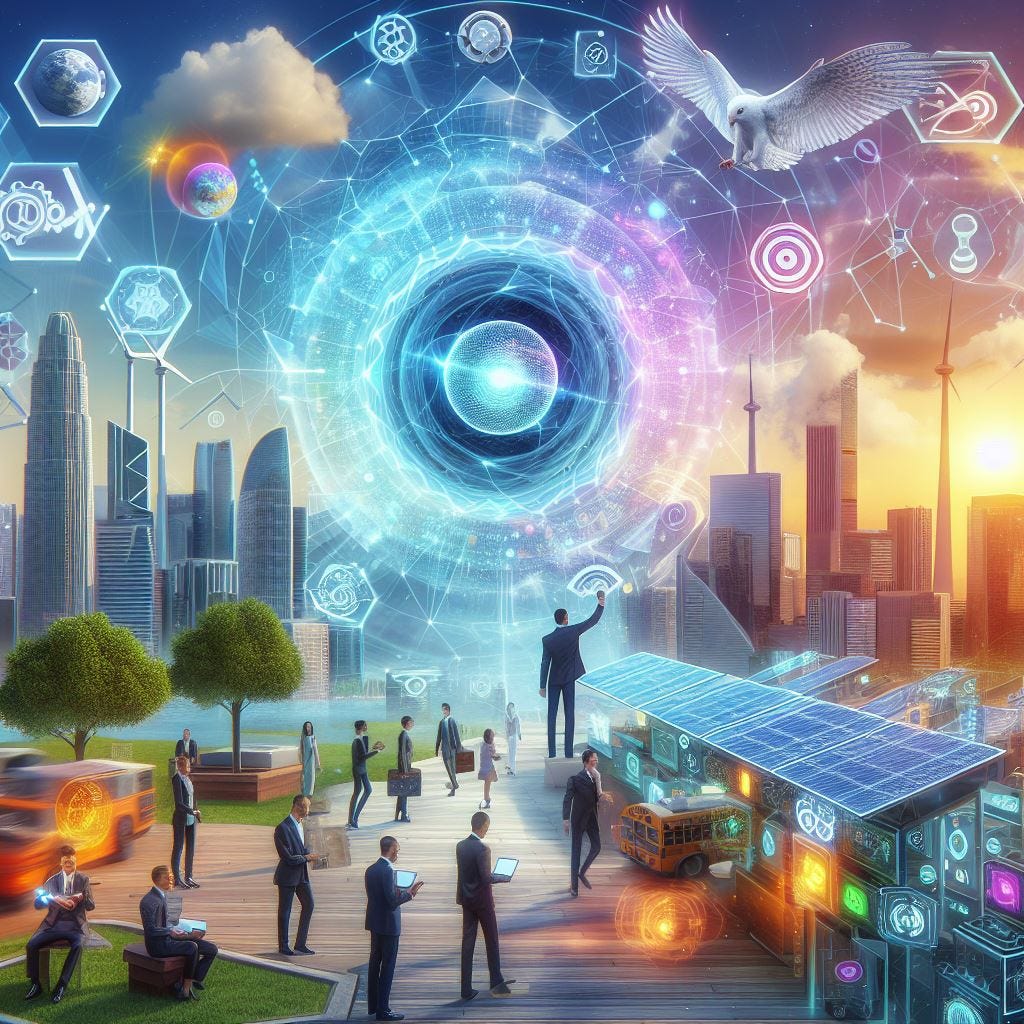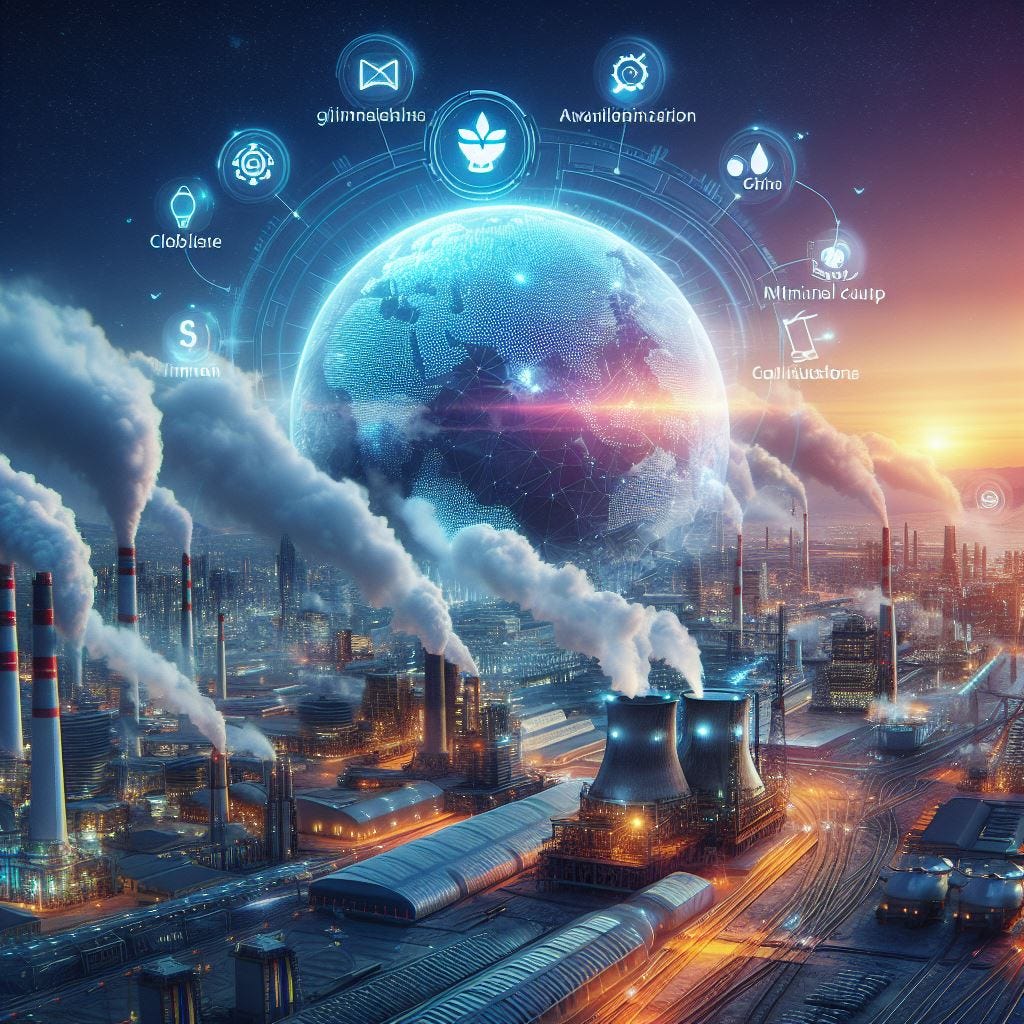Tech Revolution 2024: AI's Impact on Jobs, Quantum Machine Learning Challenges, Crypto Predictions, and Climate Solutions
Navigating the Future: Unveiling the Transformative Power of AI, Quantum Machine Learning, Cryptocurrency Projections, and Climate Solutions in 2024
How AI and Emerging Technologies Are Transforming Jobs
- Over 1/3 of business leaders predict AI will replace workers by 2023
- Jobs like customer service, telemarketing, translation, coding, accounting, security, food service, administration, travel planning, and warehouse work likely to be impacted
- Limitations around AI compute costs, ability to update, complex reasoning, and physical capability mean some human roles maintain competitive advantages
- As repetitive tasks are automated, new human jobs may open up prompting AI systems and ensuring quality control
- Key next AI frontiers enabling more job loss: reducing hallucinations, advancing AI agents for computer-based jobs, achieving human-level artificial general intelligence
The Uncertain Promise of Quantum Machine Learning
- Quantum computing promises more efficient problem-solving than classical computers by harnessing quantum effects
- Machine learning allows computers to recognize patterns and make inferences about new situations based on data
- Combining these technologies has generated excitement about revolutionizing computing
- Significant obstacles temper short-term expectations around quantum machine learning
- Translating classical data into quantum states can eliminate processing speed advantages
- No clear examples yet of quantum algorithms substantially outperforming classical machine learning algorithms
- Quantum sensing to directly analyze quantum data could overcome challenges interfacing with classical systems
- Mathematical proofs less important than ongoing experiments for realizing transformative quantum machine learning applications
HEADLIME IS THE GO-TO GPT-3 TOOL FOR MARKETERS.
WRITESONIC IS ONE OF THE BEST ARTIFICIAL INTELLIGENCE-POWERED COPYWRITING GPT-3 TOOLS.
AI Predicts Positive Crypto Outlook for 2024
- Google's Bard AI predicts 2024 Bitcoin price peak from $50,000 to $120,000 based on analyst forecasts related to Bitcoin halving, spot ETF approvals
- Missed more bullish $532,000 target for 2024 from analyst PlanB
- Bard and ChatGPT estimate SEC will approve spot bitcoin ETF in early 2024 or January/April 2024 due to growing institutional crypto adoption
- AI systems forecast optimistic overall 2024 crypto trends powered by expanding mainstream institutional investment
AI Advances Climate Solutions from Emissions Tracking to Mineral Mining
- AI efficiently processes massive environmental data to track threats like energy industry methane emissions via satellite
- Startup Dryad uses AI to detect early wildfires from sensors in forests
- Researchers developed AI assistants to help managers safely schedule preventative controlled burns
- AI speeds search for scarce minerals needed for EVs, solar panels, and other green technologies
- Helps minimize uncertainty in locating lithium, cobalt, copper supplies facing soaring demand
- Overall, AI unlocks climate insights from data to advance sustainability solutions
The Uncertain Promise of Quantum Machine Learning
Quantum computing promises to solve certain problems more efficiently than classical computers by harnessing quantum mechanical effects. Machine learning, an application of artificial intelligence, allows computers to recognize patterns and make inferences about new situations based on data. The combination of these two cutting-edge technologies into "quantum machine learning" generates excitement about revolutionizing computing.
However, significant obstacles temper short-term expectations. Translating classical data into and out of quantum states can negate any speed advantages during processing. There are also no definitive examples yet where quantum algorithms significantly outperform classical ones for machine learning tasks. Still, some researchers suggest quantum computing could spot hard-to-detect patterns.
Quantum sensing to directly load quantum data for analysis could overcome interface inefficiencies with classical systems. This approach could enable sharper images from networked observatories or better understand abstract quantum properties like superconductivity. But the feasibility remains distant.
Ultimately, whether quantum machine learning realizes transformative applications will rely more on ongoing experiments than mathematical proofs. But despite uncertain near-term prospects, quantum machine learning merits continued research efforts.
How AI and Emerging Technologies Are Transforming Jobs
Advanced AI systems and other emerging technologies are rapidly advancing and beginning to transform many jobs. Over a third of business leaders predict that AI will replace workers in 2023. While some jobs like customer service, telemarketing, translation, coding, accounting, security, food service, administration, travel planning, and warehouse work are likely to be impacted, not all hope is lost.
There are still limitations with current AI systems regarding compute costs, ability to update with new information, handling complex reasoning tasks, and physical capability. So while the demand for certain jobs may decrease due to automation, humans still maintain some competitive advantages. Jobs involving sensitive data, complex translations, staying updated on laws and regulations, creative tasks, dexterous physical work, and roles needing a human touch are less exposed.
Additionally, as routine and repetitive tasks get automated, some new jobs may open up to work alongside AI by prompting, making sense of results, taking action on insights, and oversight to ensure quality control. However, to stay competitive, professionals will need to continually adapt to emerging technologies.
The key next frontiers enabling more job loss will be reducing hallucinations in language models, advancing AI agents to automate computer-based jobs, and achieving artificial general intelligence (AGI) with human-level reasoning skills. While the timeline is unclear, proactively future-proofing skills and focusing on uniquely human abilities around complex cognition, empathy, creativity, and dexterity will likely lead to the most career stability. Overall, staying vigilant of technological advancements and embracing smart augmentation will be imperative.
AI Predicts Positive Crypto Outlook for 2024
The rise of generative AI like ChatGPT and advancements in crypto adoption have prompted speculation on how these technologies may intersect in 2024. When asked to forecast Bitcoin's peak price that year, Google's Bard AI estimated a range of $50,000-$120,000 based on analyst predictions tied to catalysts like the Bitcoin halving and spot ETF approvals. However, it missed a more bullish $532,000 target from analyst PlanB.
Bard and ChatGPT also weighed in on the long-awaited SEC decision for a spot bitcoin ETF, with Bard predicting early 2024 approval thanks to growing institutional crypto adoption. More specifically, ChatGPT forecasted January or April 2024. Beyond prices and regulation, the AI systems view crypto's overall 2024 trends optimistically, powered by expanding institutional investment leading to broader mainstream acceptance.
AI Advances Climate Solutions from Emissions Tracking to Mineral Mining
Artificial intelligence is finding climate-oriented applications across industries. AI can efficiently process massive datasets related to environmental threats. For example, it enables detailed satellite tracking of potent methane emissions from the energy industry and other sources. Startup Dryad uses AI to train forest sensors to detect early-stage wildfires. Researchers also developed AI assistants that help managers safely schedule preventative controlled burns.
On the solutions side, AI speeds exploration for scarce minerals critical to green technologies like EVs and solar. It minimizes uncertainty in locating lithium, cobalt, copper, and other limited supplies that face soaring demand. Whether pinpointing pollution, averting megafires, or accelerating sustainable mining, AI unlocks climate insights from existing data at unmatched scale. Still, generative models have substantial energy footprints to consider. Overall, AI uncovers environmental insights that can advance sustainability.









